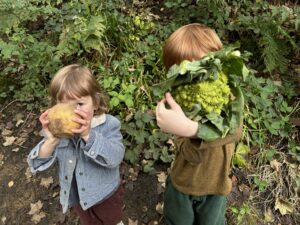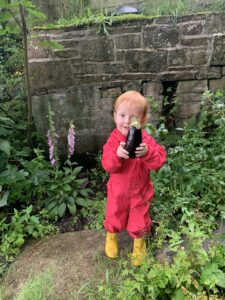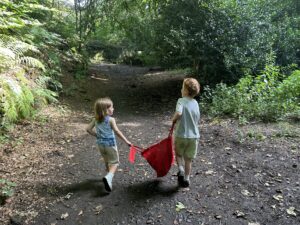Walking through the woods to collect the vegetable bag, Amy Liptrot’s sons leave babyhood — and make strides towards independence.

On Friday afternoons we go down through the woods and pick up our vegetable bag, left in a shed down the hill. We’ve been doing it since my elder son was one and first walking: wobbly steps became running ahead, then his little brother joined us, carried at first then walking too. The walk takes between twenty minutes and two hours. In different weathers and seasons, we follow a rocky path through the trees, crossing two little streams, then down some big steps cut into the side of the valley, over a river once used to power the mills of town and strewn with industrial remains. There is a thicket the three-year-old calls his ‘doctor house’, a clearing with a fire pit, a gate to open.
It can be a rich time involving scrambling up slopes, taking short cuts behind some trees for thrilling minutes of independence, spotting squirrels, discovering the joy of a wild wee. I give them a vegetable each to carry on the way home, an important job. I have photos over the years of them with a leek in each hand, with an aubergine the size of their heads, with a bulb of fennel.

This is the last of these monthly columns, following us through a year of getting outdoors. For us, it’s not about extreme adventures or expensive activities, it’s finding ways to have time in the natural world in our routine, allowing the kind of unstructured play we know is so valuable. A recent Japanese study found that thirty minutes a day free play outdoors is enough to counteract detrimental effects of screen time. My ten-year-old niece introduced me to the phrase “touch grass”, used as a putdown to tell someone to be less online, or even as an ironic boast among self-aware tweens with screens: “I haven’t touched grass for days”. It might be obvious but these columns have been about our real life attempts — for my benefit as much as the kids’ — to keep touching grass.
I will stop writing about my children as much now, but I am glad to have captured this year: the last year of their babyhood. I write things I want to remember, like how when they are excited they both run with their mouths open and tongues out, like puppies. I want to remember this time when they both fully believe in the healing power of my kiss and several times a day I contort my lips to nettle stings or pavement scrapes on little knees and ankles. I want to remember the twenty minutes of calm on our vegetable walk when, at the end of a fraught day, the toddler fell asleep and I laid him on a bench and gave his big brother a fruit scone and he sat on my knee and told me a little about his day at school — about digraphs and marbles — and then we were quiet together under the trees, listening to the river.

We’ve done the vegetable walk together enough that the boys, now almost-six and three, think they can do it on their own. With instructions to stay together and on the path, they go off — my heart into the woods — and I stand at our living room window for slow minutes. My pulse is rising slightly before they appear — carrying new sticks — at the bottom of the woods, look up at me and give the thumbs-up signal as agreed before going to get the bag. I know the five-year-old can open the door catch and read my name on the bag.
I go into the woods and meet them on the way back up, the little one carrying the loaf of bread and his brother struggling with the weight of the vegetables, proud but glad to see me. I take the bag from them, give one a romanesco and the other a turnip, and, carrying our produce for the week, we walk the rest of the way together.